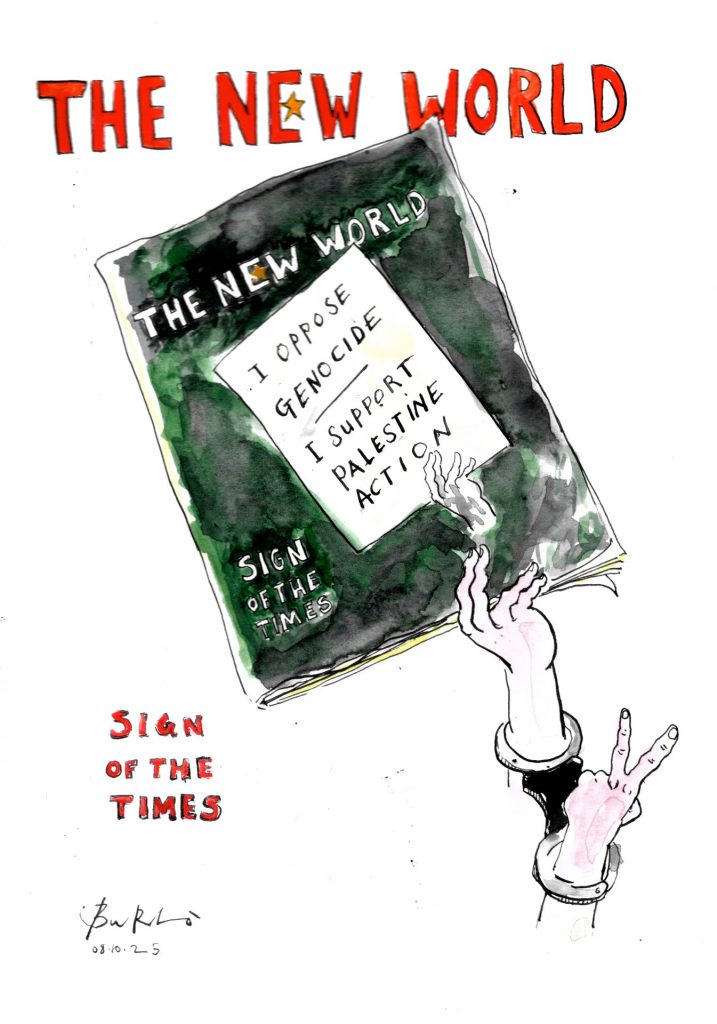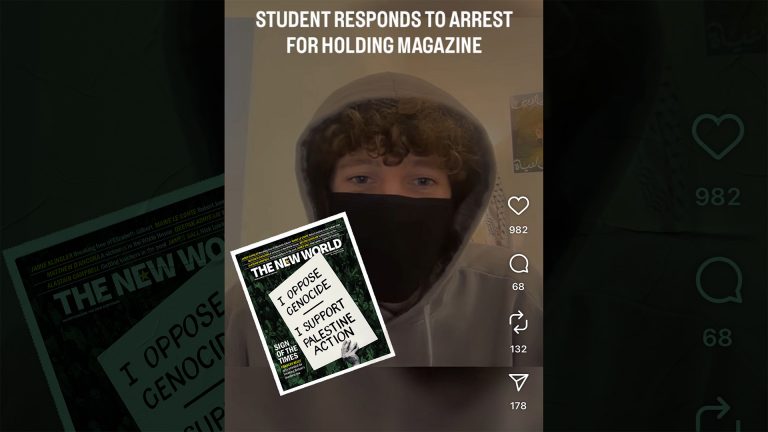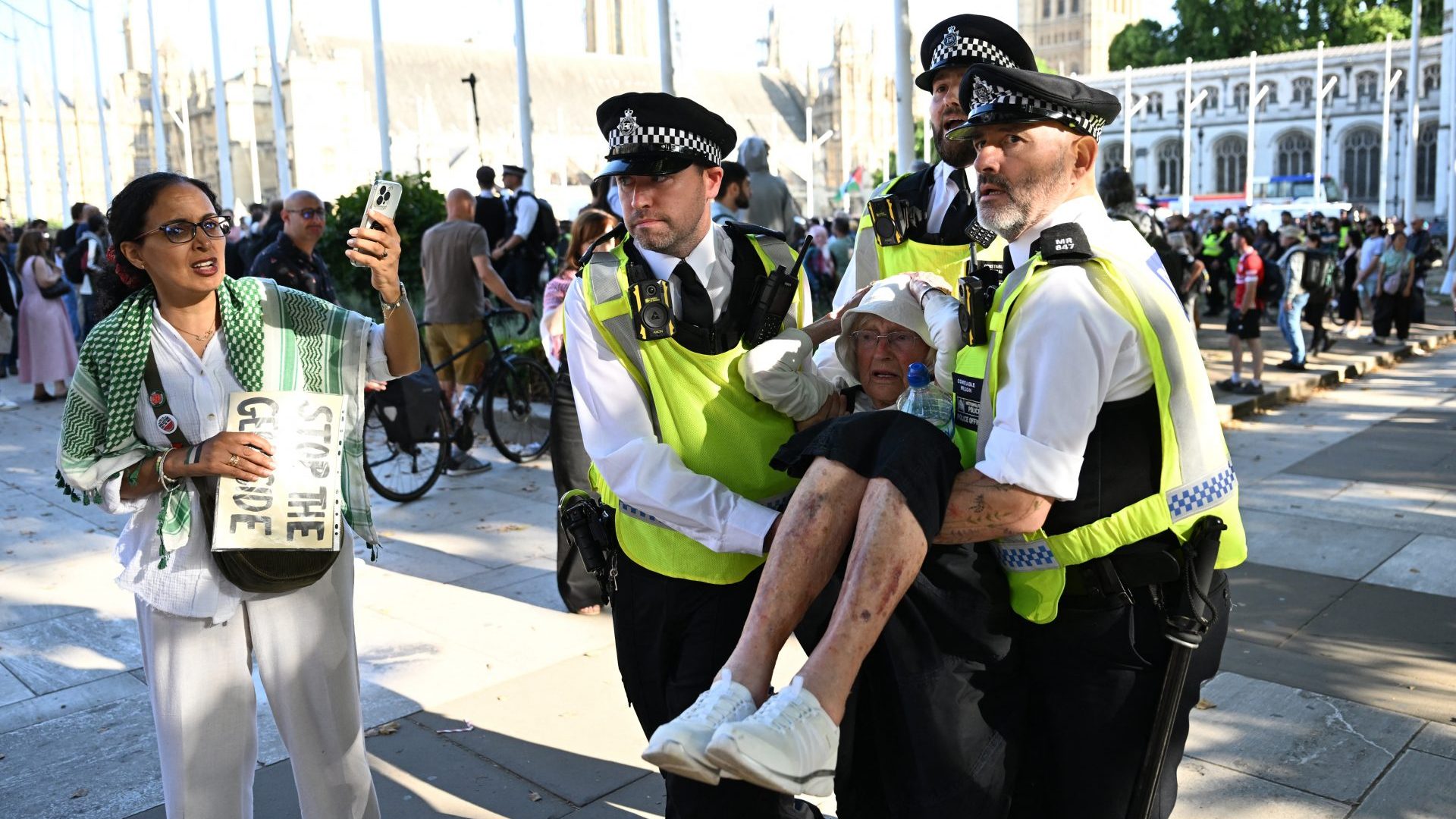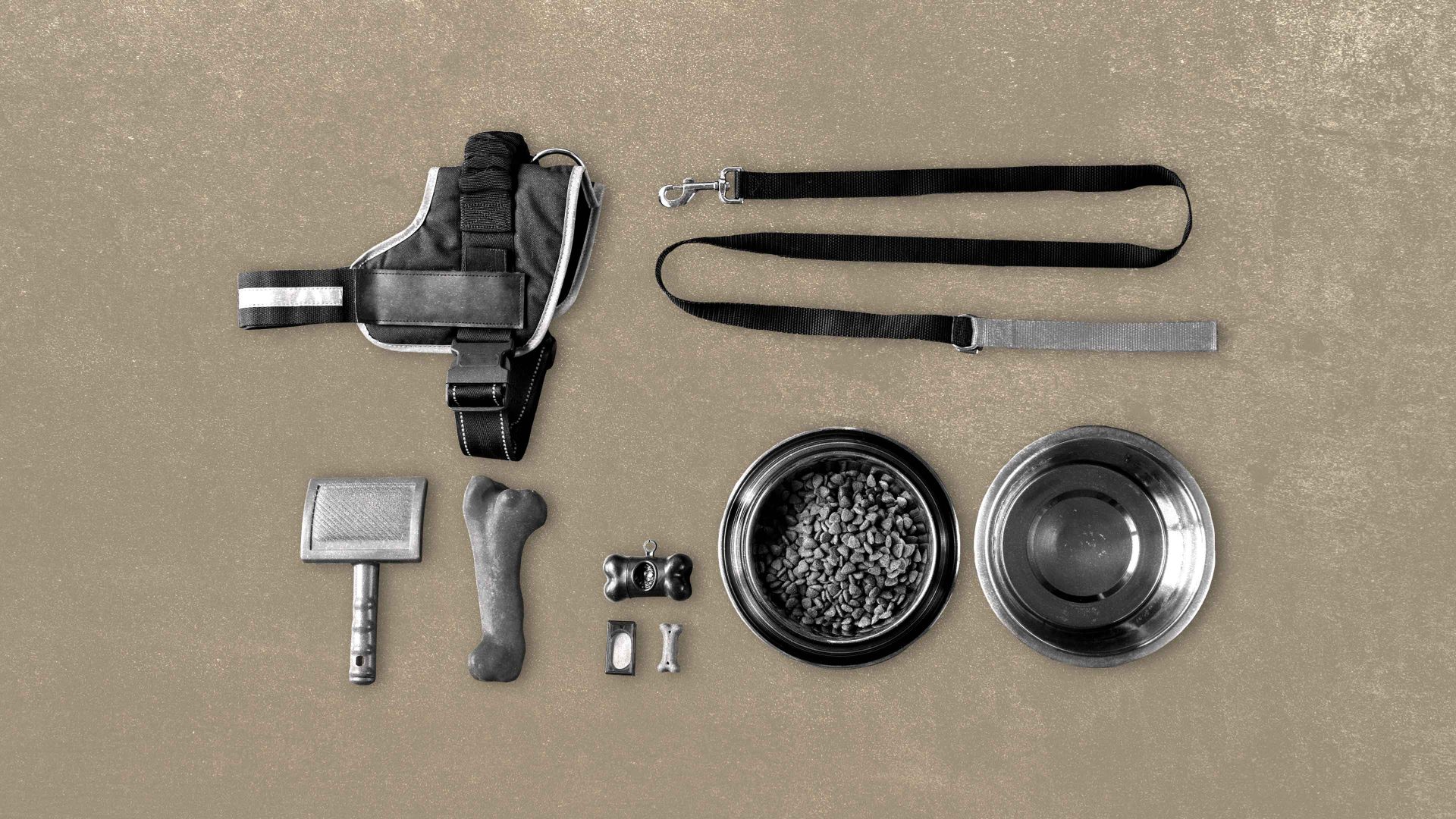In the 100 days since then home secretary Yvette Cooper’s proscription of Palestine Action, more than 2,100 protesters have been arrested under Section 13 of the Terrorism Act 2000.
The vast majority of arrests have been for displaying homemade placards with the outlawed formulation: “I oppose genocide. I support Palestine Action.”
Only one arrest was made for holding up a copy of a magazine – this magazine.
Luka, a 23-year-old university student from Cornwall, was arrested outside King’s Cross train station for holding up that week’s edition of The New World, with its cover featuring a photograph of the familiar protest placard.
He bought his copy at the King’s Cross WH Smith – one of 10,000 retailers openly selling The New World, with its apparently seditious cover.
I’ve spoken at length with Luka. You can read my interview with him on our website. He comes across as a sincere and thoughtful young man, appalled – like so many millions of Britons – at the actions of the Israeli government in Gaza. He is now on bail until January. If prosecuted, it will have lifelong effects on his ability to work and travel.
Luka’s arrest for holding up a magazine in public may seem pure farce. Yet it is the sharp end of a creeping authoritarianism that threatens not only to criminalise thousands of peaceful people, but also to create a frightening precedent for suppression of protest by future governments even more allergic to dissent than this current one.
A climate of crackdown has been created; inhibiting and suppressing legitimate protest.
The specific offence – Section 13 – for which these protesters have been arrested makes it illegal “to wear an item of clothing or to wear, carry or display an article in such a way as to arouse reasonable suspicion of being a member or supporter of PA”.
That “reasonable suspicion” that one may be a supporter of Palestine Action has swept up peaceful protesters of all ages and creeds. Even people like Laura Murton, who was arrested simply because police reckoned she looked like she might be a supporter of Palestine Action.
Laura demonstrated at a roundabout in Canterbury in July by holding a Palestinian flag and a sign reading “Free Gaza”. Armed police were captured on video ordering her to desist and telling her: “We could have jumped out, arrested you, dragged you off in a van.”
On Monday, Laura, 43, received an apology and damages for false arrest from Kent Police; an extraordinary waste of public funds and valuable policing resources as a direct consequence of this ill-thought-through proscription.
The Terrorism Act 2000 was conceived by Tony Blair to provide overarching – and, in his words, “future-proof” – legislation to deal with grave threats to national security.

It was never intended to be used in such a draconian manner, and no overtly non-violent organisation has ever been proscribed – until now.
Indeed, at the time of the new Act, the inclusion of “damage to property” – the rationale behind today’s proscription of Palestine Action – was fiercely resisted as overreach, but the government insisted it was necessary; the IRA’s practice of advance warnings meant buildings were bombed without injuries or loss of life.
The government of the day described the idea that mere criminal damage would be covered by these terror laws as “scare stories”. Well, today, under this Labour government, the scare stories have become reality.
Government sources have, off the record, justified the proscription of Palestine Action by alluding to secret intelligence reports indicating that the threat is much greater than it seems at face value.
Suggested Reading


Arrested for holding up a copy of The New World. How bloody un-British
They have produced no evidence of this greater threat, and the claim contradicts the security services’ own opinion. According to a report from MI5’s Joint Terrorism Analysis Centre, Palestine Action “primarily uses direct action tactics” that “typically result in minor damage to property”.
There is nothing in the actions of Palestine Action to date that could not be dealt with under existing laws, like criminal damage, trespass and obstruction, which have been used repeatedly against other direct-action protest groups such as Extinction Rebellion and Just Stop Oil.
If it is true there is some darker side to Palestine Action that the public is unaware of, the Home Office owes it to the public to be explicit about it – lest thousands of protesters find themselves expressing support for an organisation that actually merits proscription.
As it is, the Home Office has created, in proscribing Palestine Action, an injustice that resonates with ordinary, peaceful citizens quite willing to accept the risk of criminalisation in defence of their freedom of expression and protest – two rights explicit in the European Convention on Human Rights, enshrined (for the time being) in British law.
Regrettably, rather than reversing the effects of this hasty proscription, the new home secretary, Shabana Mahmood, looks set to intensify this assault on our freedom to protest.
Mahmood has gone on record to say that “holding a placard supporting Palestine Action” will “always be met by a police response”, and she has promised to introduce yet more laws, including the concept of limiting repeated protest. It will, according to Amnesty International, make Britain one of the most repressive regimes in Europe when it comes to our right to protest.
This magazine’s opposition to the arrests of old women waving homemade placards, or students brazenly holding up magazines in public, has nothing to do with the actions of Israel in Gaza, and everything to do with our belief that a healthy society must be able to engage in democratic discourse without state suppression.
Suggested Reading


Meet Luka, the man arrested for terrorism for holding up The New World
When I spoke to Luka this week, assuring him of the support of The New World, he made the point that many MPs, including Yvette Cooper, had donned Suffragette sashes and posed for a photograph in Westminster to celebrate that movement’s legacy on the very same day they voted to proscribe Palestine Action.
“The hypocrisy is staggering,” he said.
That the Suffragettes were, if anything, considerably more destructive in pursuit of their aims than Palestine Action have been appears to have been lost on them.
One can only wonder how Yvette Cooper and Shabana Mahmood would have dealt with the likes of Emmeline Pankhurst and Millicent Fawcett, whose statues they now walk past on their way to work, and whose sashes they today admire.
The grounds for the proscription of Palestine Action are, at best, dubious. The arrest and threat of making criminals of thousands of peaceful protesters is stupid, pointless, and a national embarrassment.
Peaceful civil disobedience in the UK is increasingly being reframed as a national security issue. It is – to frame it in language Keir Starmer is fond of – un-British, and it should end.
Matt Kelly is founder and editor-in-chief of The New World



